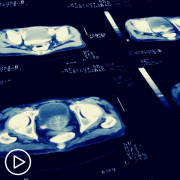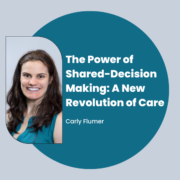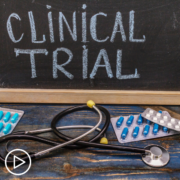Why Should Prostate Cancer Patients Be Empowered?
Why Should Prostate Cancer Patients Be Empowered? from Patient Empowerment Network on Vimeo.
Prostate cancer researcher Dr. Andrew Armstrong explains how he empowers his patients and describes the positive benefits of speaking up in your own care.
Dr. Andrew J. Armstrong is a medical oncologist and director of clinical research at the Duke Cancer Institute’s Center for Prostate and Urologic Cancers. For more information on Dr. Armstrong here.
See More from Engage Prostate Cancer
Related Resources

|

An Expert’s Perspective on Emerging Prostate Cancer Research |

Key Questions for Prostate Cancer Patients to Ask Before Joining a Clinical Trial |
Transcript:
Katherine Banwell:
How do you empower patients?
Dr. Armstrong:
Well, I empower patients by talking and listening. So, listening probably the most important part. Just getting to know somebody and their family is empowering them. You’re understanding their values, their preferences, understanding what side effects they’ve experienced in the past, what comorbidities or health conditions they’re facing, what their fears are. You know, what spiritual values they might bring, what support systems they might bring.
Every patient is different, and part of a consultation is getting to know the person in front of you, and that empowers them to be honest. Empowers you to be transparent and get to know them so that you can help them sift through a complex decision.
Giving information is really important, so I do a lot of talking as well as listening.
But giving information back to the patient about risks and benefits of treatment A, B, or C or no treatment is critical. And then there is a lot of then listening to that shared decision about what might be right for that patient and navigating it.
Katherine Banwell:
Why is it important for patients to be empowered?
Dr. Armstrong:
It’s important for patients to be empowered, because this can often be a life-threatening decision. It’s important because this is ultimately their decision for their body, and making this decision can have major consequences that patients have to live with. Doctors empower patients to make the right decisions so they’re comfortable and don’t have regrets looking back on life and these important decisions. Whether this is picking surgery or radiation, or picking initial surveillance, or enrolling on a trial, or starting hormonal therapy.
I think each decision sometimes is reversible, but sometimes is a big decision that can’t be taken back, and making sure that that patient feels empowered, that they don’t have regrets later, that they’ve gotten all the information to make an informed decision is really critical.










